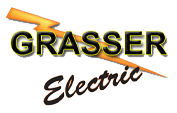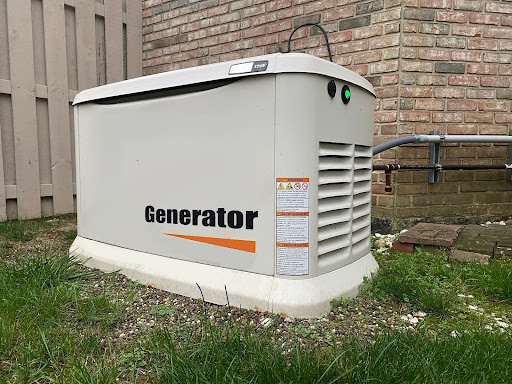When the power goes out, having a reliable backup generator can turn a stressful emergency into a minor inconvenience. But choosing the right size backup generator for your home isn’t just about grabbing the first one that fits your budget. It’s about matching your energy needs with the right equipment so your lights stay on, your sump pump keeps your basement dry, and your essential appliances stay powered.
At Grasser Electric, we help homeowners make smart choices that bring comfort, safety, and peace of mind, even when the electrical grid goes dark.
Why Generator Size Matters
Generator size is measured in watts or kilowatts (kW), and it refers to how much electricity the unit can supply at once. If you choose a generator that’s too small, you risk overloading it every time your furnace kicks on or you use your electric water heater. On the other hand, an oversized unit wastes fuel, increases noise, and may strain your budget unnecessarily.
The right-sized generator ensures all your vital systems, from your air conditioning to your lighting and kitchen appliances, run smoothly during a power outage. With proper load management, your home’s circuit breakers and transfer switch can work together to prioritize high-demand equipment while maintaining safety and fuel efficiency.
Calculating Your Energy Needs
Before selecting a generator, consider the appliances and systems you want to keep running during an outage. You’ll need to think about essentials like:
- Refrigerator and freezer
- Sump pump
- Furnace or heat pump
- Air conditioning
- Lighting in key areas
- Water heater (especially if it’s electric)
- Kitchen equipment (like your oven or microwave)
- Clothes dryer
- Security system
- Medical equipment, if applicable
The total wattage of these appliances will give you a ballpark figure for the generator size you need.
Online tools or a professional calculator can help, but nothing beats a consultation with an experienced electrician who understands your home’s layout, energy habits, and wiring.
At Grasser Electric, we consider everything from the volt requirements of each appliance to your generator’s fuel source, whether that’s propane, natural gas, or gasoline.
Types of Backup Generators: Portable vs. Standby
Once you know how much power you need, the next step is deciding between a portable generator and a permanent standby generator.
Portable generators are budget-friendly and useful in short-term or low-power scenarios. You can manually connect them to a few devices or critical appliances, but they often require storing gasoline, dealing with noise, and handling transfer switch connections manually. They’re great for running a tool or charging devices, but they may not support large systems like central air conditioning or a heat pump.
Standby generators, also known as whole-home generators, are professionally installed and tied into your home’s power system. They switch on automatically when there’s a power outage and can run off your home’s existing natural gas or propane line, eliminating the need to refill a fuel tank. They’re quieter, more reliable, and designed to run your entire home or at least all the important stuff seamlessly.
Grasser Electric can help you decide which style fits your home, lifestyle, and security needs.
Factors That Impact Generator Sizing
There’s more to generator sizing than wattage. You’ll also want to consider:
- Fuel Type: Natural gas and propane generators offer cleaner fuel options and longer run times than gasoline models.
- Load Management: Do you want to power everything at once or prioritize only essentials like your sump, heat, and lighting?
- Location: Will your generator be installed outside near your basement or kitchen? Noise, exhaust, and ventilation should all be considered.
- Startup Surge: Equipment like your furnace, air conditioner, water heater, or refrigerator might draw more electricity when starting up. Your generator needs to handle that load without tripping your circuit breakers.
- Budget: A higher upfront investment might save money in fuel and maintenance down the line. Grasser Electric can help you find a model that balances performance and affordability.
And don’t forget future-proofing. If you’re planning to add an electric vehicle charger, update your air conditioning, or renovate your kitchen with new appliances, your power needs may increase. The right-sized generator today might save you from a costly upgrade later.
Trust the Pros for a Safe, Smart Installation
Installing a backup generator isn’t a DIY weekend project. It involves electrical work, fuel line connections, transfer switch setup, and compliance with local codes and utility regulations.
That’s where Grasser Electric comes in. Our licensed electricians will assess your home’s layout, calculate your exact energy needs, and recommend a generator that keeps everything running without wasting fuel or risking overload.
We also handle everything from circuit breaker upgrades to proper grounding, ventilation, and safety measures, like carbon monoxide protection. We make sure your generator is ready for any emergency.
Call Grasser Electric Today
Choosing the right size backup generator is one of the smartest investments you can make in your home. It protects your appliances, preserves your comfort, and brings peace of mind during even the longest power outages. With the help of Grasser Electric, you’ll never be left in the dark.
Ready to get started? Contact Grasser Electric today for a personalized consultation and expert backup generator installation, electrical service, or a panel upgrade. Let us help you power through the next outage efficiently, quietly, and confidently.

